- Home
- Christopher Paolini
Inheritance i-4 Page 20
Inheritance i-4 Read online
Page 20
The four of them went to the windlass, being careful not to slip on the pools of blood, and studied it for a moment as they figured out its workings.
Roran spun around, raising his hammer as he heard a clink of metal and then the loud creak of a wooden trapdoor being pulled open, followed by a clatter of footsteps as a soldier descended the winding staircase from the gate tower above.
“Taurin, what in the blazes is going-” The soldier’s voice died in his throat and he stopped partway down the stairs as he caught sight of Roran and his companions, as well as the mangled bodies in the corner.
A warrior to Roran’s right threw a spear at the soldier, but the soldier ducked and the spear struck the wall above him. The soldier cursed and scrambled back up the stairs on all fours, vanishing behind a curve of the wall.
A moment later, the trapdoor slammed shut with an echoing boom, and then they heard the soldier wind a horn and shout frantic warnings to the people in the square.
Roran scowled and returned to the windlass. “Leave him,” he said, shoving his hammer under his belt. He leaned against the spoked wheel used to raise and lower the portcullis and pushed as hard as he could, straining every muscle. The other men added their strength to his, and slowly, ever so slowly, the wheel began to turn, the ratchet on the side of the windlass clicking loudly as the huge wooden catch slid over the teeth below.
The effort needed to turn the wheel became substantially easier a few seconds later, a fact that Roran attributed to the team he had sent to infiltrate the other guardhouse.
They did not bother to raise the portcullis all the way; after a half minute of grunting and sweating, the fierce war cries of the Varden reached their ears as the men waiting outside charged through the gate and into the square.
Roran released the wheel, then pulled out his hammer again and made for the stairs with the others in tow.
Outside the guardhouse, he spotted Carn and Delwin just as they emerged from the structure on the other side of the gate. Neither appeared injured, but Roran noticed that the older warrior who had accompanied them was now absent.
While they waited for Roran’s group to rejoin them, Baldor and the rest of the Varden organized themselves into a solid block of men at the edge of the square. They stood five ranks deep, shoulder to shoulder with their shields overlapping.
As he trotted over to them, Roran saw a large contingent of soldiers emerge from among the buildings at the far side of the square. There they assumed a defensive formation, angling their spears and pikes outward, so they resembled a long, low pincushion stuck full of needles. He estimated that about one hundred fifty soldiers were present-a number that his warriors could certainly overcome, but at a cost of both time and men.
His mood grew even more grim as the same hook-nosed magician whom he had seen on the previous day stepped out in front of the rows of soldiers and spread his arms above his head, a nimbus of black lighting crackling around each of his hands. Roran had learned enough about magic from Eragon to know that the lightning was probably more for show than anything else, but show or not, he had no doubt that the enemy spellcaster was enormously dangerous.
Carn arrived at the head of the warriors seconds after Roran. Together they and Baldor gazed at the magician and the ridge of soldiers assembled in opposition.
“Can you kill him?” Roran asked quietly, so the men behind him could not hear.
“I’ll have to try, now won’t I?” replied Carn. He wiped his mouth with the back of his hand. Perspiration beaded his face.
“If you want, we can rush him. He can’t kill us all before we wear down his wards and put a blade through his heart.”
“You don’t know that.… No, this is my responsibility, and I have to deal with it.”
“Is there anything we can do to help?”
Carn uttered a nervous laugh. “You could shoot some arrows at him. Blocking them might weaken him enough that he’ll make a mistake. But whatever you do, don’t get between us.… It won’t be safe, for you or for me.”
Roran transferred his hammer to his left hand, then placed his right on Carn’s shoulder. “You’ll be fine. Remember, he’s not that clever. You tricked him before, and you can trick him again.”
“I know.”
“Good luck,” said Roran.
Carn nodded once, then walked toward the fountain in the center of the square. The light from the sun had reached the plume of dancing water, which glittered like handfuls of diamonds tossed into the air.
The hook-nosed magician also walked toward the fountain, matching his steps to Carn’s until they stood only twenty feet apart, whereupon they both stopped.
From where Roran was standing, Carn and his opponent appeared to be talking to each other, but they were too far away for him to make out what they said. Then both of the spellcasters went rigid, as if someone had jabbed them with poniards.
That was what Roran had been waiting for: a sign that they were dueling with their minds, too busy to pay attention to their surroundings.
“Archers!” he barked. “Go there and there,” and he pointed at either side of the square. “Put as many arrows into that traitorous dog as you can, but don’t you dare hit Carn or I’ll have you fed alive to Saphira.”
The soldiers shifted uneasily as the two groups of archers advanced partway across the square, but none of Galbatorix’s crimson-clad troops broke formation or moved to engage the Varden.
They must have a great deal of confidence in that pet viper of theirs, Roran thought, concerned.
Dozens of brown, goose-feather-fletched arrows arched spinning and whistling toward the enemy magician, and for a moment, Roran hoped that they might be able to kill him. Five feet from the hook-nosed man, however, every single shaft shattered and dropped to the ground, as if they had run headlong into a wall of stone.
Roran bounced on his heels, too tense to stand still. He hated having to wait, doing nothing, while his friend was in danger. Moreover, every passing moment gave Lord Halstead more of an opportunity to figure out what was happening and devise an effective response. If Roran’s men were to avoid being crushed by the Empire’s superior forces, they had to keep their enemies off balance, unsure of where to turn or what to do.
“On your toes!” he said, turning to the warriors. “Let’s see if we can do some good while Carn is fighting to save our necks. We’re going to flank those soldiers. Half of you come with me; the rest follow Delwin here. They can’t block off every single street, so Delwin, you and your men work your way past the soldiers, then loop back around and attack them from behind. We’ll keep them busy on this front, so they won’t put up much resistance. If any of the soldiers try to run, let them. It would take too long to kill them all anyway. Got it? … Go, go, go!”
The men quickly separated into two groups. Leading his, Roran ran up the right-hand edge of the square, while Delwin did the same on the left.
When both bands of men were almost level with the fountain, Roran saw the enemy magician look toward him. It was the merest flicker of a glance, sidelong and fleeting, but the distraction, whether intended or not, seemed to have an immediate effect on his duel with Carn. As the hook-nosed man returned his gaze to Carn, the snarl upon his face deepened into a painful rictus, and veins began to bulge on his knotted brow and on his corded neck, and his whole head flushed a dark, angry red, as if it were so swollen with blood that it might burst asunder.
“No!” howled the man, and then he shouted something in the ancient language that Roran could not understand.
A fraction of a second later, Carn shouted something as well and, for a moment, their two voices overlapped with such a dire mixture of terror, desolation, hate, and fury that Roran knew deep in his bones that the duel had somehow gone horribly wrong.
Carn vanished amid a blaze of blue light. Then a white, dome-like shell flashed outward from where he had been standing and expanded across the square in less time than it took Roran to blink.
The wo
rld went black. An unbearable heat pressed against Roran, and everything turned and twisted around him as he tumbled through a formless space.
His hammer was wrenched out of his hand, and pain erupted in the side of his right knee. Then a hard object smashed into his mouth, and he felt a tooth pop loose, filling his mouth with blood.
When he finally came to rest, he remained where he was, lying on his belly, too stunned to move. His senses gradually returned, and he saw the smooth, gray-green surface of a paving stone underneath his nose, and he smelled the lead mortar that surrounded the stone, and all throughout his body he became aware of aches and bruises clamoring for his attention. The only sound he could hear was that of his pounding heart.
Some of the blood in his mouth and throat went into his lungs as he started to breathe again. Desperate for air, he coughed and sat upright, spitting out gobs of black phlegm. He saw the tooth, one of his incisors, fly out and bounce against the paving stone, startling white against the splotches of spewed blood. He caught it and examined it; the end of the incisor was chipped, but the root appeared intact, so he licked the tooth clean then pushed it back into the hole in his gums, wincing as he poked the sore flesh.
Levering himself off the ground, he got to his feet. He had been thrown against the doorstep of one of the houses that bordered the square. His men were scattered about him, arms and legs askew, helmets lost, swords torn away.
Again Roran was grateful that he carried a hammer, for several of the Varden had managed to stab themselves or their shield mates during the tumult.
Hammer? Where is my hammer? he belatedly thought. He cast about the ground until he spotted the handle of his weapon protruding from beneath the legs of a nearby warrior. He pulled it free, then turned to look at the square.
Soldiers and Varden alike had been tossed sprawling. Nothing remained of the fountain except for a low pile of rubble from which water spurted at erratic intervals. Next to it, where Carn had been, lay a blackened, withered corpse, its smoking limbs clenched tight, like those of a dead spider, the whole thing so charred and pitted and burned away that it was barely recognizable as anything that had once been alive or human. Inexplicably, the hook-nosed magician still stood in the same place, though the explosion had robbed him of his outer clothes, leaving him wearing nothing but his breeches.
Uncontrollable anger gripped Roran, and without a thought for his own preservation, he staggered toward the center of the square, determined to kill the magician once and for all.
The bare-chested conjurer held his ground even as Roran drew near. Raising his hammer, Roran broke out into a shambling run and shouted a war cry that he could hear but dimly.
And yet the magician made no move to defend himself.
In fact, Roran realized that the spellcaster had not stirred so much as an inch since the explosion. It was as if he were a statue of a man and not the thing itself.
The spellcaster’s seeming indifference to Roran’s approach tempted Roran to ignore the man’s unusual behavior-or lack of behavior, as it was-and simply bash him over the head before he recovered from whatever strange stupor ailed him. However, Roran’s wariness cooled his lust for vengeance and caused him to slow to a stop not five feet from the magician.
He was glad he did.
While the magician had appeared normal from a distance, up close, Roran saw that his skin was loose and wrinkled like that of a man thrice his age, and that it had acquired a coarse, leathery texture. The color of his skin had darkened as well, and was continuing to darken, moment by moment, as if his entire body had been bitten by frost.
The man’s chest was heaving and his eyeballs were rolling in their sockets, showing white, but other than that, he seemed incapable of movement.
As Roran watched, the man’s arms, neck, and chest shriveled, and his bones appeared in sharp relief-from the bowlike curve of his collarbones to the hollow saddle of his hips, where his stomach hung like an empty waterskin. His lips puckered and drew back farther than they were intended to over his yellow teeth, baring them in a grisly snarl, while his eyeballs deflated as if they were engorged ticks being squished empty of blood, and the surrounding flesh sank inward.
The man’s breathing-a panicked, high-pitched sawing-faltered then, but still did not entirely cease.
Horrified, Roran stepped backward. He felt something slick beneath his boots and looked down to see that he was standing in a spreading puddle of water. At first he thought it was from the broken fountain, but then he realized that the water was flowing outward from the feet of the paralyzed magician.
Roran cursed, revulsion filling him, and jumped to a dry patch of ground. Seeing the water, he understood what it was Carn had done, and his already profound sense of horror increased. Carn, it seemed, had cast a spell that was drawing every single drop of moisture from the magician’s body.
Over the span of only another few seconds, the spell reduced the man to no more than a knobby skeleton wrapped in a shell of hard black skin, mummifying him the same as if he had been left in the Hadarac Desert, exposed to a hundred years of wind and sun and shifting sands. Although he was most certainly dead by then, he did not fall, as Carn’s magic held him upright: a ghastly, grinning specter that was the equal of the most terrible things Roran had ever seen in his nightmares or on the battlefield-both being much the same.
Then the surface of the man’s desiccated body blurred as it dissolved into a fine gray dust, which sifted downward in gauzy curtains and lay floating atop the water below, like ashes from a forest fire. Muscle and bone soon followed, then the stony organs, and then the last parts of the hook-nosed magician crumbled away, leaving behind only a small, conical mound of powder rising out of the pool of water that had once sustained its life.
Roran looked over at Carn’s corpse, then looked away just as quickly, unable to bear the sight. At least you had your revenge onhim. Then he put aside thoughts of his slain friend, for they were too painful to dwell on, and instead concentrated upon the most immediate problem at hand: the soldiers at the southern end of the square, who were slowly picking themselves up off the ground.
Roran saw the Varden doing much the same. “Oi!” he shouted. “With me! We’ll never have a better chance than now.” He pointed at some of his men who were obviously wounded. “Help them up and put them in the center of the formation. No one gets left behind. No one!” His lips and mouth throbbed as he spoke, and his head ached as if he had been up all night drinking.
The Varden rallied at the sound of his voice and hurried to join him. As the men gathered into a broad column behind him, Roran took his place in the foremost rank of warriors, between Baldor and Delwin, both of whom bore bloody scrapes from the explosion.
“Carn is dead?” Baldor asked.
Roran nodded and lifted his shield, as did the other men, so that they formed a solid, outward-facing wall.
“Then we better hope Halstead doesn’t have another magician hidden away somewhere,” Delwin muttered.
When the Varden were all in place, Roran shouted, “Forward march!” and the warriors tramped across the remainder of the courtyard.
Whether because their leadership was less effective than the Varden’s or because the blast had dealt them a more severe blow, the Empire soldiers had failed to recover as quickly and so were still disorganized when the Varden drove into their midst.
Roran grunted and staggered back a step as a spear embedded itself in his shield, numbing his arm and dragging it down through sheer weight. Reaching around, he swept his hammer across the face of the shield. It bounced off the haft of the spear, which refused to budge.
A soldier in front of him, perhaps the very one who had thrown the spear, seized the opportunity to run at him and swing his sword at Roran’s neck. Roran started to lift his shield, along with the spear lodged in it, but it was too heavy and cumbersome for him to protect himself with. So he used his hammer instead, lashing out at the descending sword.
On edge, however,
the blade was almost impossible for him to see, and he timed his parry badly and missed the sword with his hammer. He would have died then, except that his knuckles clipped the flat of the blade, deflecting it several inches to the side.
A line of fire cut through Roran’s right shoulder. Jagged bolts of lightning shot down his side, and his vision flashed bright yellow. His right knee buckled and he fell forward.
Stone underneath him. Feet and legs around him, hemming him in so he could not roll away to safety. His whole body sluggish and unresponsive, as if he were trapped in honey.
Too slow, too slow, he thought as he struggled to free his arm from the shield and get his feet back under him. If he stayed on the ground, he would be either stabbed or trampled. Too slow!
Then he saw the soldier collapse in front of him, clutching at his belly, and a second later, someone pulled Roran up by the collar of his hauberk and held him upright while he regained his footing. It was Baldor.
Twisting his neck, Roran looked at where the soldier had struck him. Five links in his mail shirt had split open, but other than that, the armor had held. Despite the blood oozing out of the rent, and the pain that racked his neck and arm, he did not think the wound was life-threatening, nor was he about to stop and find out. His right arm still worked-at least enough to continue fighting-and that was all he cared about at the moment.
Someone passed him a replacement shield. He grimly shouldered it and pressed onward with his men, forcing the soldiers to retreat along the wide street that led from the square.
The soldiers soon broke and ran in the face of the Varden’s overwhelming strength, fleeing down the myriad side streets and alleys that branched off the thoroughfare.
Roran paused then and sent fifty of his men back to close the portcullis and sally port and to guard them against any foes who might seek to follow the Varden into the heart of Aroughs. Most of the soldiers in the city would be stationed close to the outer wall to repel besiegers, and Roran had no desire to face them in open battle. To do so would be suicidal, given the size of Halstead’s forces.

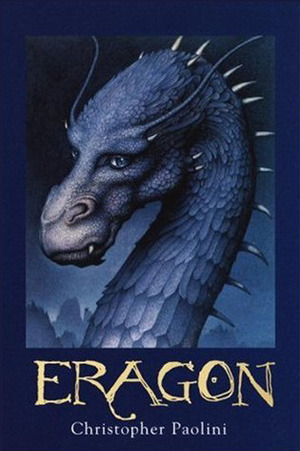 Eragon
Eragon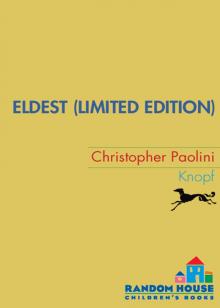 Eldest
Eldest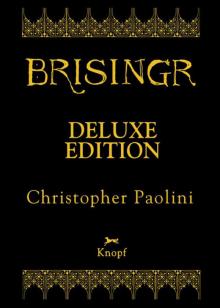 Brisingr
Brisingr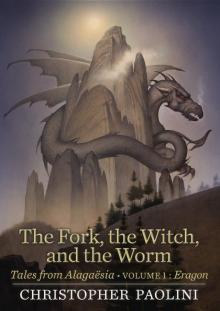 The Fork, the Witch, and the Worm
The Fork, the Witch, and the Worm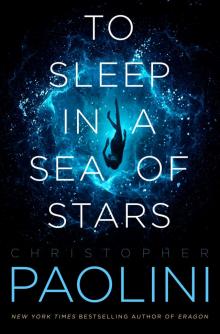 To Sleep in a Sea of Stars
To Sleep in a Sea of Stars![Eldest [en] i-2 Read online](http://i1.bookreadfree.com/i/03/19/eldest_en_i-2_preview.jpg) Eldest [en] i-2
Eldest [en] i-2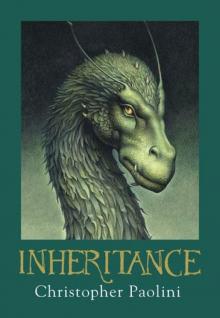 Inheritance i-4
Inheritance i-4![Brisingr [en] i-3 Read online](http://i1.bookreadfree.com/i1/03/31/brisingr_en_i-3_preview.jpg) Brisingr [en] i-3
Brisingr [en] i-3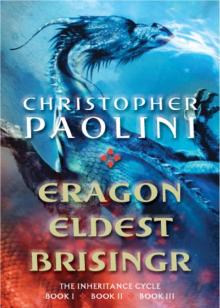 Inheritance Cycle Omnibus
Inheritance Cycle Omnibus